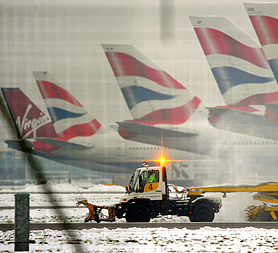UK snow: who pays for the airport mayhem?
As Britain battles a sixth day of travel chaos, Patrick Winters of Airfinance Journal looks at who pays for the snow delays, and how the airlines will fare.

Heathrow has borne the brunt of the mayhem, as airports across Europe report closures and delays due to poor weather conditions – while airlines have had to cancel and reschedule flights during one of the busiest travel periods of the year.
Under European laws, airlines must assist passengers when flights are delayed – this can cover food, communications and overnight accommodation if necessary.
Passengers can request a refund for delays of more than five hours, and if a flight is cancelled alternative options should be offered, or a full refund.
Flight insurance policies generally do not pay out unless there is physical damage to the aircraft, says Paul Mitchell, an aviation analyst at Aon Risk Solutions.
Under European laws, airlines must assist passengers when flights are delayed – this can cover food, communications and overnight accommodation if necessary
While a weather insurance product was offered in the past, very few airlines took it up because the cost was too high for the limited risk of an extreme weather disruption.
Some airports may be insured for business interruption, which pays for their lost revenue, but not third party claims.
However, it is hard to break down the costs between airports, airlines and passengers, according to Mitchell.
Owen Geach, commercial director at the International Bureau of Aviation, said: “In the short term there will be cash implications, but on the whole airlines will recoup not all but the majority of the outlay from passengers rebooking.
“Though airlines have a duty to care for passengers while they wait for another flight, they also save on fuel and maintenance costs when the aircraft is grounded. This will soften the blow”, Geach added.
Unlike the volcanic ash cloud that caused global disruptions to flights in April, passengers are more likely to stick with their travel plans during the Christmas period, opting for a later booking rather than cancelling their flight. This will also cushion any passenger revenue losses for airlines.
BA pointed out to Channel 4 News however that it is offering passengers the chance to rebook their seats free of charge – leaving the airline losing revenue from the rebooked seat – which they might have sold to a future traveller.
Snow and having to give refunds are going to be the straw that break the camel’s back in a few cases – Owen Geach, IBA
Meanwhile, not all airlines are in a position to bear the rebooking cost – which could force some into liquidation, according to Geach. He said: “Snow and having to give refunds are going to be the straw that break the camel’s back in a few cases”.
Geach has previously predicted that around half a dozen European airlines will go bankrupt by mid-year 2011. However, he warned that the misery brought on airlines by this month’s harsh weather could push some into bankruptcy as early as late January or February next year.
Patrick Winters is a reporter for Airfinance Journal